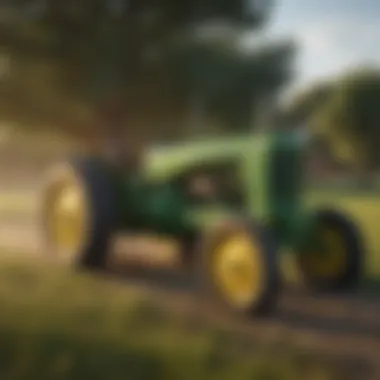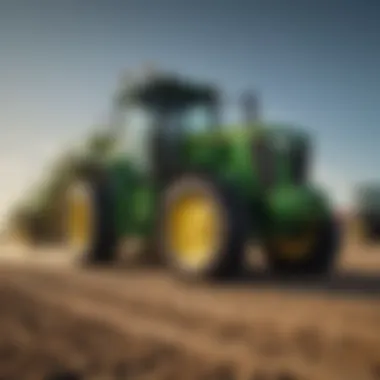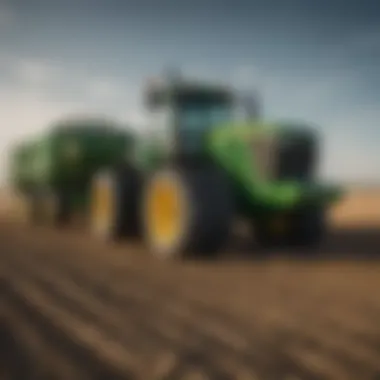John Deere's Impact in Comanche, Texas


Intro
John Deere has become synonymous with agriculture and farming machinery. In the small town of Comanche, Texas, this brand holds a special place, both historically and in its role in present-day agricultural practices. The town's relationship with John Deere is a vivid illustration of how one brand can impact a community and its economy. This article aims to explore various facets of John Deere's presence in Comanche, highlighting its historical significance, product offerings, community engagement, and commitment to technological advancements in agriculture.
Understanding the nuances of John Deere's influence in Comanche requires delving into key concepts and terminology associated with the brand and its products. This exploration provides insight into agricultural advancements and the principles underpinning sustainable farming practices that are essential for both local farmers and the larger farming community.
As we progress through this article, you will discover innovative technologies that John Deere develops to meet modern agricultural needs. Additionally, we will consider both practical applications for farmers and the future of agricultural practices influenced by John Deere's ongoing research and development initiatives. Through this comprehensive overview, the readers will be equipped with a deeper understanding of John Deere's legacy in Comanche and its broader implications in the agricultural sector.
Prelims to John Deere
Understanding John Deere's influence is essential for grasping the agricultural landscape in Comanche, Texas. Established as a vital part of American farming culture, John Deere's presence goes beyond selling machinery. It involves shaping farming practices, contributing to the local economy, and offering innovative solutions that meet the needs of modern farmers. This introducation serves as a lens through which we can view the intersection of history, technology, and community engagement.
History of John Deere
John Deere was founded in 1837 by a blacksmith named John Deere. He created a steel plow that could handle the tough soil of the American Midwest. This invention marked a turning point for farmers who struggled with wooden plows. Over the decades, John Deere evolved from a small blacksmith shop into a leading manufacturer of agricultural machinery. The company expanded its product line, introducing tractors, harvesters, and other farming implements that have become indispensable in modern agriculture.
As John Deere moved into the 20th century, the company embraced technological advancements. In the post-war era, it was pivotal in mechanizing farming, helping farmers increase production and efficiency. Today, John Deere stands as a global brand, synonymous with quality, reliability, and innovation in agriculture.
Brand Philosophy and Mission
John Deere's mission statement reflects a commitment to providing high-quality equipment that helps farmers succeed. The company's philosophy centers on the idea of partnership with their customers. John Deere seeks to understand the needs and challenges faced by farmers, providing them with the tools, technology, and support required to thrive.
The brand believes in fostering sustainable practices, promoting operational efficiency, and enhancing the agricultural experience overall. Key considerations in their approach include:
- Customer Focus: Tailoring solutions to specific customer needs.
- Quality and Innovation: Continuously improving product offerings and introducing new technologies.
- Sustainability: Emphasizing environmentally friendly practices that benefit both farmers and the planet.
By maintaining these core principles, John Deere has established itself as more than just a manufacturer of farming equipment. It represents a legacy of commitment to the agricultural community, greatly impacting farming practices in Comanche and beyond.
Overview of Comanche, Texas
The section on Comanche, Texas, serves a critical role in understanding the broader context of John Deere's presence and influence in this region. Comanche is situated in Central Texas and is known for its rich agricultural heritage and vibrant community life. This overview provides a backdrop that connects the community's demographics and economy to the agricultural practices that underpin its local identity. The interplay of these elements highlights why John Deere’s contributions to the area are both significant and far-reaching.
Demographics and Economy
Comanche has a population of around 4,000 residents, making it a small but significant community. The demographic composition includes a mix of long-time residents alongside newer families drawn by opportunities in technology and agriculture. The local economy is largely dependent on agriculture, with cattle ranching and crop farming being the primary sectors.
Several key factors define the economy of Comanche:
- Agricultural Exports: The region exports various commodities, particularly cotton and cattle, forming the backbone of the economy.
- Employment Opportunities: Agriculture provides numerous job opportunities, directly impacting the local unemployment rate, which remains lower than the national average.
- Local Businesses: Support industries such as feed supply stores, processing facilities, and agricultural equipment dealerships, including John Deere, also contribute heavily to the economy.
The economy of Comanche demonstrates resilience and adaptability, making it a vital player in the Texas agricultural landscape.
Agricultural Practices in Comanche
Agricultural practices in Comanche reflect the area's commitment to both tradition and innovation. Farmers in the region employ a combination of time-honored methods and modern techniques to maximize productivity and sustainability.
Key practices include:
- Crop Rotation: Many farmers utilize crop rotation to maintain soil health and maximize yield. This method helps in preventing soil depletion and managing pests.
- Sustainable Techniques: The adoption of sustainable farming techniques, such as no-till farming, conserves moisture and improves soil structure, aligning with John Deere’s commitment to sustainability.
- Use of Technology: Precision farming technologies are increasingly common. Farmers utilize GPS-guided machinery, many of which are manufactured by John Deere, to optimize planting and harvesting processes.


Comanche’s agricultural landscape is marked by a balance between tradition and progress, showcasing the continual evolution of farming practices.
"Agriculture is not just about growing crops; it’s about cultivating a sustainable future for our community."
These practices not only ensure the local economy remains robust but also play a pivotal role in supporting the overall landscape of Texas agriculture.
John Deere Equipment Offerings
John Deere Equipment Offerings are fundamental to understanding the brand's contribution to agriculture, especially in areas like Comanche, Texas. The equipment provided by John Deere goes beyond mere machines; it encompasses technological innovations that enhance productivity and efficiency among local farmers. This segment captures various types of equipment, highlighting features, advantages, and considerations that make John Deere a trusted name in farming.
Tractors and Harvesters
Tractors are often considered the backbone of modern agriculture, and John Deere excels in this segment. They offer several models with various horsepower options, catering to different land sizes and types. Additionally, they are equipped with advanced technologies like GPS guidance systems that increase accuracy while reducing input costs. Harvesters from John Deere, such as the S700 Series, are engineered to provide high performance in diverse crop conditions.
The benefits of using these machines are directly observed in yield improvements. Farmers report that the efficiency of John Deere harvesters allows for quicker gathering of crops, ensuring optimal harvest times. This major advantage is critical in areas like Comanche, where agricultural output can significantly affect local economies.
Planting and Tillage Equipment
John Deere's planting and tillage equipment is designed to facilitate effective soil management, essential for maintaining healthy crops. The ExactEmerge planter, for instance, employs advanced technology that ensures accurate seed placement and depth control. This leads to uniformity in crop growth and maximizes plant population.
Moreover, the tillage implements offered by John Deere assist in soil preparation, making it ready for planting. By breaking up compacted soil and promoting aeration, farmers can enhance moisture retention and nutrient uptake. This is particularly important as regions like Comanche are often subject to varied soil conditions that require careful management.
Application Equipment
The application of fertilizers and pesticides is critical in modern farming practices. John Deere produces a range of sprayers and application equipment that enhance precision agriculture. Their R4030 and R4038 sprayers are notable for their capabilities, including capable of adapting to a farmer's specific operational needs.
The core benefit of John Deere application equipment is the precision it offers. By enabling targeted application, farmers can minimize waste and reduce costs, which is highly beneficial for maintaining profitability. Additionally, these machines integrate with technology to offer data-driven insights, providing farmers with the information they need to make informed decisions.
"Efficiency and precision in farming are not just advantages; they are necessities in today's agricultural landscape."
Through a focus on these specific offerings, John Deere ensures that farmers in Comanche, Texas, have access to equipment that meets modern agricultural needs. This commitment to innovation and quality solidifies John Deere's position as a leader in the farming industry.
Technological Innovations at John Deere
The landscape of agriculture is rapidly evolving, and with it, the technological innovations introduced by John Deere, particularly in Comanche, Texas, play a pivotal role. These innovations not only enhance farming efficiency but also address the urgent need for sustainable practices within the industry. As we delve deeper into this section, we will explore the significance of various technological advancements that John Deere has incorporated into its equipment and services, focusing on the benefits and considerations surrounding precision agriculture tools and autonomous machinery developments.
Precision Agriculture Tools
John Deere has positioned itself as a leader in precision agriculture. Precision agriculture refers to farming management based on observing, measuring, and responding to variability in crops. This approach leads to better resource management and increased productivity.
Key components of John Deere's precision agriculture tools include:
- GPS Technology: High accuracy of positioning aids farmers in planting crops with precision, ensuring optimal plant spacing and density.
- Yield Mapping: This process helps farmers visualize crop yield across different sections of their field, allowing targeted interventions to boost productivity.
- Soil Sensors: These devices provide real-time feedback on soil conditions, helping farmers make informed decisions regarding irrigation and fertilization.
Implementing these tools results in several benefits. Farmers can save costs by minimizing wastage of resources such as water, seed, and fertilizer. Additionally, their ability to enhance crop yields supports local economies in Comanche. With a future focused towards sustainability, precision agriculture represents a significant advancement in reducing environmental impact.
Autonomous Machinery Developments
As technology continues to advance, so does the concept of autonomous machinery in agriculture. John Deere has been at the forefront of this trend, developing machines that can operate without direct human intervention.
Innovations in this area include:


- Self-Driving Tractors: These vehicles utilize advanced algorithms to navigate fields autonomously, reducing the labor costs and allowing farmers to focus on strategic decision-making.
- Drones for Crop Monitoring: Equipped with various sensors, these drones provide a bird's eye view of the fields, enabling prompt action against pest issues or crop diseases.
- Automated Harvesting Equipment: Such equipment adapts to varying crop conditions to ensure optimal harvest without manual labor.
The implementation of autonomous machinery presents a variety of advantages. It enhances efficiency, can operate in diverse weather conditions, and significantly reduces fatigue-related risks for operators. Moreover, this technology is poised to address the labor shortages faced in agriculture today by performing repetitive tasks with greater accuracy.
"Technological innovations empower farmers to optimize yield while promoting sustainability."
Impact on the Local Community
The presence of John Deere in Comanche, Texas, goes beyond mere business operations. It has a significant impact on the local community, shaping the economic landscape and transforming agricultural practices. Understanding this impact is crucial for recognizing how organizations can contribute to localities and why their roles are essential. In this context, John Deere supports both economic growth and educational initiatives, fostering a symbiotic relationship with local agriculture and the broader community.
Job Creation and Economic Growth
John Deere plays a vital role in job creation in Comanche. The company contributes directly by employing a considerable number of people in the area. These jobs often provide competitive wages and good benefits, which in turn boosts local spending and stimulates the economy. An influx of job opportunities attracts workers from surrounding regions, enhancing the local labor pool.
The economic growth driven by John Deere also extends to local businesses. As employees purchase goods and services in Comanche, the revenue generated supports retail establishments, restaurants, and service providers. This interconnectedness creates a thriving local economy that can sustain itself through various economic cycles.
Moreover, John Deere’s presence encourages local farmers to invest in advanced technologies and equipment, enhancing productivity. This technological adoption not only boosts farmers' output but also increases the demand for related services, which further elevates job opportunities in the community.
Educational Initiatives and Local Partnerships
John Deere is aware that the future of agriculture relies on a skilled workforce. Therefore, the company invests in educational initiatives within the Comanche community. They collaborate with local schools to develop programs that prepare students for careers in agriculture and related industries. These programs often include vocational training, internships, and hands-on experience with equipment.
Such partnerships extend learning beyond the classroom. Workshops and seminars offered by John Deere engage both students and adults. They encourage knowledge sharing not only about machinery but also about sustainable farming practices, modern technologies, and efficient land management.
By nurturing local talent, John Deere helps create a workforce that can sustain and innovate in the agricultural sector. This initiative benefits everyone, from the company to local farmers and the community as a whole.
"Investing in education ensures that the next generation of farmers is equipped to meet future challenges in agriculture."
Through such contributions, John Deere strengthens its connection to Comanche, ensuring that the community is well-prepared for a sustainable agricultural future.
Customer Experiences and Testimonials
Customer experiences and testimonials serve as a vital component in assessing the impact and effectiveness of John Deere’s offerings in Comanche, Texas. They not only provide an insight into the real-world performance of equipment but also create a narrative around the brand's reputation among its users. In agriculture, where tools and machinery are critical to operational success, feedback from local farmers can significantly influence purchasing decisions and customer loyalty.
Understanding how farmers perceive John Deere's products helps illustrate the brand's commitment to quality and service. The feedback collected from user experiences often highlights the durability and efficiency of the machines, as well as the support offered by local dealers. Furthermore, testimonials can uncover areas for potential improvement, guiding John Deere in making necessary adjustments or innovations in product design or customer service strategies. Having a direct line of communication with the customer base allows the company to adapt more swiftly to the real needs and expectations within the community.
Success Stories from Local Farmers
Local farmers in Comanche have many success stories regarding their experiences with John Deere equipment. One notable example involves a corn grower who increased his yield by 15% after switching to John Deere’s 8R Series tractor. The updated hydraulic technology and auto-steering feature allowed for more precise planting and less operator fatigue, directly contributing to the farmer's improved productivity.
Another farmer shared how adopting John Deere’s S780 combine harvester transformed his harvesting operations. According to him, the high-capacity grain tank and powerful engine significantly reduced the time spent on harvesting, enabling him to cover more acres within the same timeframe. This case demonstrates how investing in modern agronomic solutions from John Deere can translate into real economic benefits for the local agricultural community.
Feedback on Product Performance
Feedback regarding John Deere’s product performance is predominantly positive but does not shy away from constructive criticism. Many local farmers appreciate the reliability and efficiency of machinery such as the 5R Series tractor and the X7 Series Gator utility vehicles. The fuel efficiency and ease of use have been frequently cited as major benefits. Farmers often highlight how these aspects lead to cost savings in both operation and maintenance.
However, there are also important considerations raised by users. Some farmers indicate a desire for more personalization options on their equipment. They suggest that the software interfaces, while advanced, could be made more user-friendly for those not as technically inclined.
Overall, these testimonials reflect the pulse of the farming community in Comanche, highlighting the intricate relationship between user experiences and the evolution of John Deere’s product line. This ongoing dialogue between the brand and its customers strengthens their mutual commitment to advancing agricultural practices sustainably.
Sustainability and Environmental Impact


Sustainability is increasingly pivotal in today’s agricultural landscape. In the context of John Deere’s activities in Comanche, Texas, this aspect influences equipment design, farming practices, and community engagement. The commitment to sustainability is not merely a marketing strategy; it is a necessary approach to ensure agricultural systems remain viable in the face of environmental challenges.
One significant benefit of focusing on sustainability is enhanced soil health, which directly affects crop yields. Sustainable practices help preserve natural resources while promoting economic stability for local farmers. The rounded aim here is to lessen the negative effects that come from traditional farming methods. By integrating sustainable techniques, John Deere supports practices that are not only eco-friendly but also economically beneficial for farmers.
"Sustainability is key to thriving agriculture and a healthier ecosystem,” emphasizes the vision of John Deere.
Sustainable Practices Encouraged by John Deere
John Deere advocates various sustainable practices that align with modern agricultural needs. Among these practices is the promotion of conservation tillage. This method minimizes the disruption of soil, thereby retaining moisture and improving biodiversity within the soil profile. Farmers using Deere's support tools can effectively execute conservation techniques that lead to better land health over time.
Another practice is the use of precision farming technology. This technology allows farmers to optimize resource use, apply fertilizers more effectively, and reduce waste. By offering solutions like the John Deere Operations Center, farmers can monitor crop health and soil conditions with data-driven insights, enhancing their decision-making process.
In addition, John Deere’s commitment to incorporating renewable energy sources into their product line is noteworthy. The use of electric and hybrid equipment is slowly gaining traction and can significantly reduce the carbon footprint of farming operations.
Contributions to Biodiversity and Soil Health
The contributions of John Deere to biodiversity and soil health cannot be overstated. By encouraging varied crop rotations and the incorporation of cover crops, John Deere facilitates greater ecological balance. Enhanced biodiversity in fields leads to better pest control and increased resilience to diseases. This interplay helps sustain agricultural systems long-term.
Furthermore, John Deere promotes soil conservation measures through educational initiatives. Workshops and field days often focus on techniques that foster soil renovation practices, essential for maintaining nutrient cycling and overall ecosystem health.
In summary, John Deere’s efforts in sustainability cater to the interests of both local farmers and the environment. The strategies put in place not only aim to reduce the ecological impact but also promote an enduring legacy within agricultural communities.
Future Directions and Innovations
The topic of future directions and innovations carries significant importance in understanding the evolving role of John Deere in Comanche, Texas. This section seeks to highlight emerging tools and concepts that can reshape agricultural practices in the near future. Innovations drive change, allowing farmers to increase efficiency and sustainability in their operations, which are critical in an industry faced with climatic and economic challenges.
Emerging Technologies and Trends
Emerging technologies in agriculture focus on precision, automation, and data utilization. These advancements have the potential to revolutionize farming, particularly in Comanche, where local farmers can leverage new tools tailored to their specific needs. Some key technologies include:
- Precision Farming: Utilizing GPS and data analytics to optimize field variations.
- Drones: Implementing aerial imagery for crop health monitoring and disease detection.
- AI and Machine Learning: Analyzing vast amounts of data to improve decision-making processes in farming.
These technologies not only enhance productivity but also promote sustainable land use practices. They encourage resource conservation and help reduce environmental impacts. Farmers equipped with such innovations are better positioned to adapt to fluctuations in market demands and climatic conditions.
Long-Term Vision for Agriculture in Comanche
The long-term vision for agriculture in Comanche must embrace sustainable development and technological advancement. Key considerations include:
- Educational Collaborations: Partnering with local institutions to develop training programs on new technologies.
- Support for Local Farmers: Providing access to resources for adopting best practices in sustainable agriculture.
- Community Engagement: Involving farmers in discussions about the future of agriculture to address unique local challenges.
John Deere's commitment to these directions aligns with the overall goal of ensuring food security while fostering economic growth in the region. The plant’s willingness to innovate and adapt will not only benefit individual farmers but also the community as a whole.
In summary, embracing future technologies, coupled with a robust support system, is vital for the continued growth and sustainability of agriculture in Comanche.
Through these concerted efforts, local stakeholders can anticipate a more resilient agricultural landscape, benefiting from advancements that ensure a prosperous future.
End
The conclusion of this article emphasizes the multifaceted role John Deere plays in Comanche, Texas. The agricultural landscape is continuously evolving, and John Deere serves as a pillar of support for local farmers. Understanding this importance leads to a broader vision for the future of agriculture in the area.
Summary of Key Insights
- Historical Significance: John Deere has a rich heritage that informs its practices today.
- Product Range: The diverse offerings, from tractors to precision technology, cater to a variety of farming needs.
- Community Impact: Job creation and educational initiatives demonstrate a commitment to local growth.
- Sustainability Focus: Practices aimed at environmental health help foster better farming strategies.
- Customer Experiences: Feedback from local farmers reveals the effectiveness of products and the support provided by John Deere.
Call to Action for Local Agricultural Stakeholders
Local agricultural stakeholders should actively engage with John Deere to leverage its resources for future growth. Consider collaborating on educational programs that bridge technology with practical farming techniques. Investing in emerging technologies together can not only enhance productivity but also further support sustainability goals. Reach out to John Deere representatives to discuss tailored solutions that meet your specific agricultural challenges. Each initiative you undertake can contribute to a lasting positive impact on the local farming community in Comanche.







